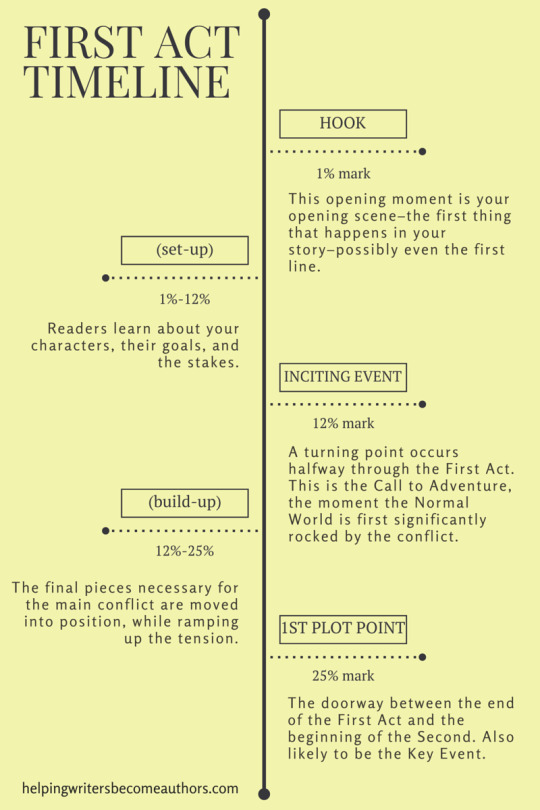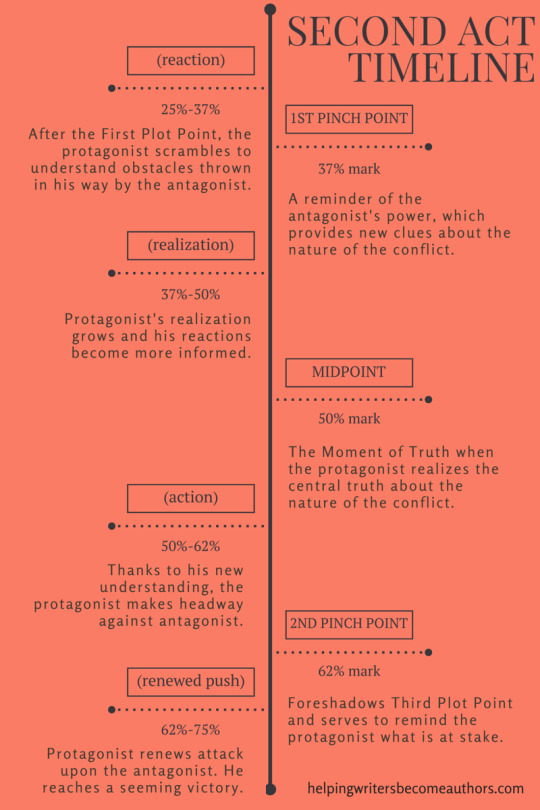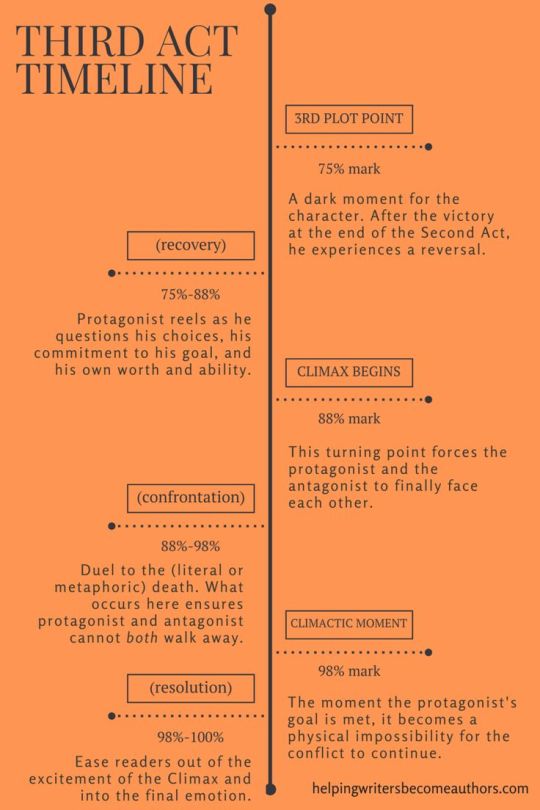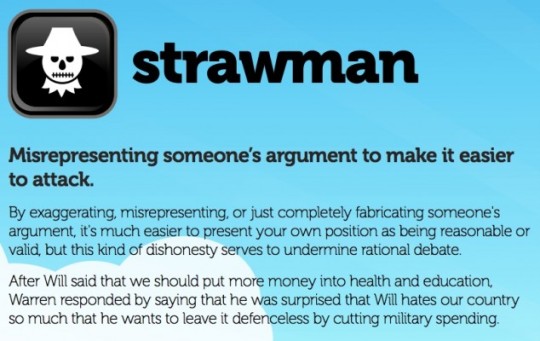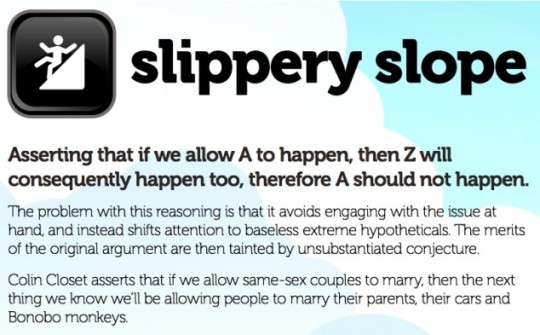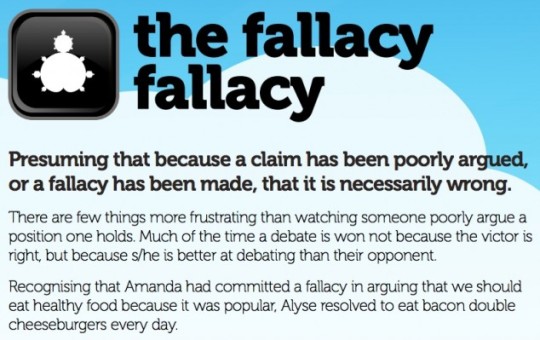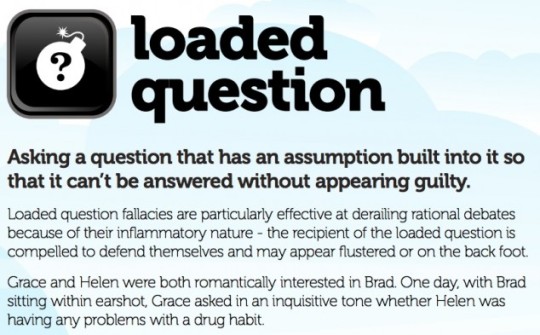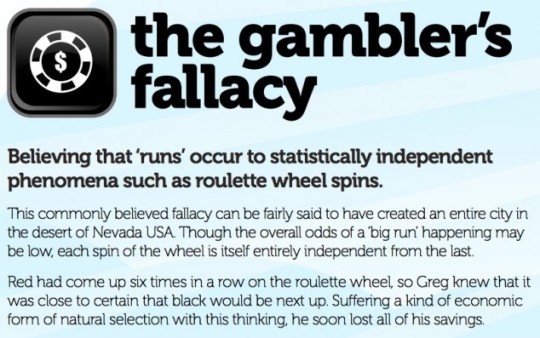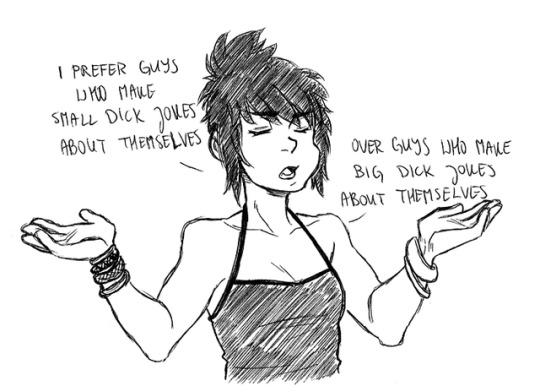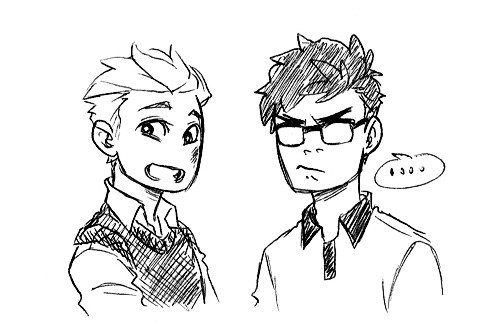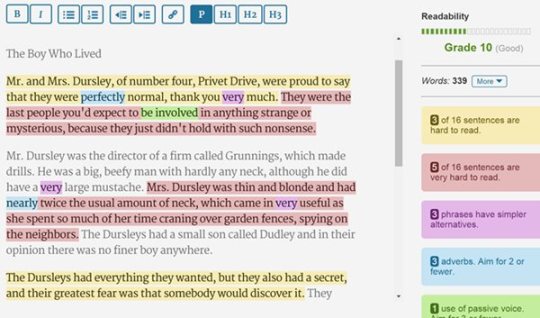Text
Your Character’s Personality
Personality is the most important thing about your character.
So, whenever I see character sheets, most people just put a little paragraph for that section. If you’re struggling and don’t know what your character should say or do, what decisions they should make, I guarantee you that this is the problem.
You know your character’s name, age, race, sexuality, height, weight, eye color, hair color, their parents’ and siblings’ names. But these are not the things that truly matter about them.
Traits:
pick traits that don’t necessarily go together. For example, someone who is controlling, aggressive and vain can also be generous, sensitive and soft-spoken. Characters need to have at least one flaw that really impacts how they interact with others. Positive traits can work as flaws, too. It is advised that you pick at least ten traits
people are complex, full of contradictions, and please forgive me if this makes anyone uncomfortable, but even bullies can be “nice” people. Anyone can be a “bad” person, even someone who is polite, kind, helpful or timid can also be narcissistic, annoying, inconsiderate and a liar. People are not just “evil” or “good”
Beliefs:
ideas or thoughts that your character has or thinks about the world, society, others or themselves, even without proof or evidence, or which may or may not be true. Beliefs can contradict their values, motives, self-image, etc. For example, the belief that they are an awesome and responsible person when their traits are lazy, irresponsible and shallow. Their self-image and any beliefs they have about themselves may or may not be similar/the same. They might have a poor self-image, but still believe they’re better than everybody else
Values:
what your character thinks is important. Usually influenced by beliefs, their self-image, their history, etc. Some values may contradict their beliefs, wants, traits, or even other values. For example, your character may value being respect, but one of their traits is disrespectful. It is advised you list at least two values, and know which one they value more. For example, your character values justice and family. Their sister tells them she just stole $200 from her teacher’s wallet. Do they tell on her, or do they let her keep the money: justice, or family? Either way, your character probably has some negative feelings, guilt, anger, etc., over betraying their other value
Motives:
what your character wants. It can be abstract or something tangible. For example, wanting to be adored or wanting that job to pay for their father’s medication. Motives can contradict their beliefs, traits, values, behavior, or even other motives. For example, your character may want to be a good person, but their traits are selfish, manipulative, and narcissistic. Motives can be long term or short term. Everyone has wants, whether they realize it or not. You can write “they don’t know what they want,” but you should know. It is advised that you list at least one abstract want
Recurring Feelings:
feelings that they have throughout most of their life. If you put them down as a trait, it is likely they are also recurring feelings. For example, depressed, lonely, happy, etc.
Self Image:
what the character thinks of themselves: their self-esteem. Some character are proud of themselves, others are ashamed of themselves, etc. They may think they are not good enough, or think they are the smartest person in the world. Their self-image can contradict their beliefs, traits, values, behavior, motives, etc. For example, if their self-image is poor, they can still be a cheerful or optimistic person. If they have a positive self-image, they can still be a depressed or negative person. How they picture themselves may or may not be true: maybe they think they’re a horrible person, when they are, in fact, very considerate, helpful, kind, generous, patient, etc. They still have flaws, but flaws don’t necessarily make you a terrible person
Behavior:
how the character’s traits, values, beliefs, self-image, etc., are outwardly displayed: how they act. For example, two characters may have the trait “angry” but they all probably express it differently. One character may be quiet and want to be left alone when they are angry, the other could become verbally aggressive. If your character is a liar, do they pause before lying, or do they suddenly speak very carefully when they normally don’t? Someone who is inconsiderate may have issues with boundaries or eat the last piece of pizza in the fridge when they knew it wasn’t theirs. Behavior is extremely important and it is advised you think long and hard about your character’s actions and what exactly it shows about them
Demeanor:
their general mood and disposition. Maybe they’re usually quiet, cheerful, moody, or irritable, etc.
Posture:
a secondary part of your character’s personality: not as important as everything else. It is advised you fill this out after. Posture is how the character carries themselves. For example, perhaps they swing their arms and keep their shoulders back while they walk, which seems to be the posture of a confident person, so when they sit, their legs are probably open. Another character may slump and have their arms folded when they’re sitting, and when they’re walking, perhaps they drag their feet and look at the ground
Speech Pattern:
a secondary part of your character’s personality: not as important as everything else. It is advised you fill this out after. Speech patterns can be words that your character uses frequently, if they speak clearly, what sort of grammar they use, if they have a wide vocabulary, a small vocabulary, if it’s sophisticated, crude, stammering, repeating themselves, etc. I personally don’t have a very wide vocabulary, if you could tell
Hobbies:
a secondary part of your character’s personality: not as important as everything else. It is advised you fill this out after. Hobbies can include things like drawing, writing, playing an instrument, collecting rocks, collecting tea cups, etc.
Quirks:
a secondary part of your character’s personality, not as important as everything else. It is advised you fill this out after. Quirks are behaviors that are unique to your character. For example, I personally always put my socks on inside out and check the ceiling for spiders a few times a day
Likes:
a secondary part of your character’s personality, not as important as everything else. It is advised you fill this out after. Likes and dislikes are usually connected to the rest of their personality, but not necessarily. For example, if your character likes to do other people’s homework, maybe it’s because they want to be appreciated
Dislikes:
a secondary part of your character’s personality, not as important as everything else. It is advised you fill this out after. Likes and dislikes can also contradict the rest of their personality. For example, maybe one of your character’s traits is dishonest, but they dislike liars
History:
your character’s past that has key events that influence and shape their beliefs, values, behavior, wants, self-image, etc. Events written down should imply or explain why they are the way they are. For example, if your character is distrustful, maybe they were lied to a lot by their parents when they were a child. Maybe they were in a relationship for twenty years and found out their partner was cheating on them the whole time. If their motive/want is to have positive attention, maybe their parents just didn’t praise them enough and focused too much on the negative
On Mental and Physical Disabilities or Illnesses
if your character experienced a trauma, it needs to have an affect on your character. Maybe they became more angry or impatient or critical of others. Maybe their beliefs on people changed to become “even bullies can be ‘nice’ people: anyone can be a ‘bad’ person”
people are not their illness or disability: it should not be their defining trait. I have health anxiety, but I’m still idealistic, lazy, considerate, impatient and occasionally spiteful; I still want to become an author; I still believe that people are generally good; I still value doing what make me feel comfortable; I still have a positive self-image; I’m still a person. You should fill out your character’s personality at least half-way before you even touch on the possibility of your character having a disability or illness
Generally everything about your character should connect, but hey, even twins that grew up in the same exact household have different personalities; they value different things, have different beliefs. Maybe one of them watched a movie that had a huge impact on them.
Not everything needs to be explained. Someone can be picky or fussy ever since they were little for no reason at all. Someone can be a negative person even if they grew up in a happy home.
I believe this is a thought out layout for making well-rounded OCs, antagonists and protagonists, whether they’re being created for a roleplay or for a book. This layout is also helpful for studying Canon Characters if you’re looking to accurately roleplay as them or write them in fanfiction or whatever.
I’m really excited to post this, so hopefully I didn’t miss anything important…
If you have any questions, feel free to send a message.
- Chick
101K notes
·
View notes
Text
Writing Tip
because I see this everywhere and most people don’t know about it. The hyphen(-), the en-dash(–) and the em-dash(—) are three completely different things with completely different uses. If you write fanfiction, it’s likely that your readers won’t care, but if you want to submit a manuscript for publishing, you need to know the difference.
The hyphen (-) is the basic symbol you find on your keyboard, and it’s meant to only be used for hyphenated words (well-being, two-thirds).
The en-dash (–) is a slightly longer dash. It’s usually the width of an uppercase N, hence the name. You can find it by looking through the ‘insert symbol’ option in MS word or many word processors, and it is meant to be used to show a particular distance, or for intervals (May–August, 1900–1916, pages 12–22)
The em-dash (—) is what people most commonly use, but they refer to it as a hyphen. It’s the longest dash, about the size of an uppercase letter M, and you can either find it through the list of symbols in your word processor, or some word processors actually automatically transform two hyphens (–) into an em-dash (—). It is meant to be used as a break in the sentence, in a place where a comma, semicolon or colon would normally be used or as a break in dialogue. (Her niece—the daughter of her oldest sister—is the one over there.)
*All three types of dashes are normally meant to be used without any spaces on either side of the dash.
18K notes
·
View notes
Text
Film Noir / Neo-Noir From Female Writers
Every film on this list either had a female screenwriter, a “story by” credit, or was based on a novel written by a woman
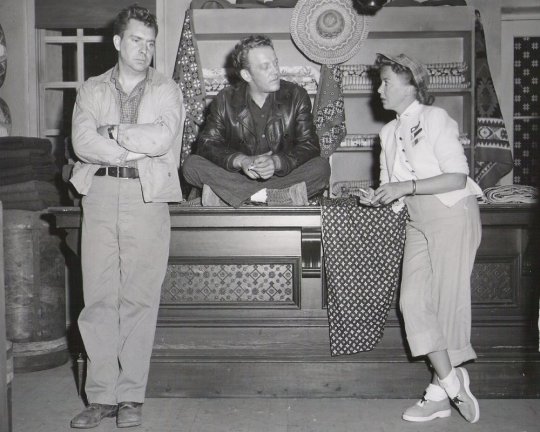
The House Across the Bay (1940)
Fingers at the Window (1942)
The Night of January 16th (1941)
Whispering Footsteps (1943)
The Fallen Sparrow (1943)
The Lodger (1944)
Guest in the House (1944)
Laura (1944)
Girl in 313 (1940)
End of the Road (1944)
Strange Illusion (1945)
Danger Signal (1945)
The Great Flamarion (1945)
The Spiral Staircase (1945)
The Lady Confesses (1945)
Mildred Pierce (1945)
The Unseen (1945)
Green for Danger (1946)
Undercurrent (1946)
Nocturne (1946)
Crime Doctor’s Man Hunt (1946)
Strange Impersonation (1946)
Bedelia (1946)
The Big Sleep (1946)
Shadow of a Woman (1946)
Desperate (1947)
The Brasher Doubloon (1947)
Whispering City (1947)
Dishonored Lady (1947)
Smash-Up: The Story of a Woman (1947)
The Upturned Glass (1947)
The Pretender (1947)
Deep Valley (1947)
Ride the Pink Horse (1947)
T-Men (1947)
A Double Life (1947)
The Arnelo Affair (1947)
Bury Me Dead (1947)
Desert Fury (1947)
Love from a Stranger (1947)
The Paradine Case (1947)
Dear Murderer (1947)
The Amazing Mr. X (1948)
Road House (1948)
The Velvet Touch (1948)
Daybreak (1948)
I, Jane Doe (1948)
The Sign of the Ram (1948)
Night Unto Night (1949)
A Woman’s Secret (1949)
The Bribe (1949)
Follow Me Quietly (1949)
Strange Bargain (1949)
The Accused (1949)
White Heat (1949)
Johnny Allegro (1949)
Shockproof (1949)
The Reckless Moment (1949)
No Man of Her Own (1950)
In a Lonely Place (1950)
Shadow on the Wall (1950)
Panic in the Streets (1950)
Guilt Is My Shadow (1950)
The Clouded Yellow (1950)
M (1951)
Strangers on a Train (1951)
The Company She Keeps (1951)
Lightning Strikes Twice (1951)
On Dangerous Ground (1951)
Affair in Trinidad (1952)
The Sniper (1952)
Talk About a Stranger (1952)
Walk East on Beacon! (1952)
Ruby Gentry (1952)
Jennifer (1953)
Man in the Attic (1953)
The Fake (1953)
The System (1953)
The Blue Gardenia (1953)
Count the Hours (1953)
The Hitch-hiker (1953) - also directed by a woman
Blackout (1954)
Make Haste to Live (1954)
Private Hell 36
Footsteps in the Fog (1955)
Shack Out on 101 (1955)
Not as a Stranger (1955)
Cast a Dark Shadow (1955)
Blonde Sinner (1956)
Over-Exposed (1956)
The Long Goodbye (1973)
1K notes
·
View notes
Text
Physical flaws to add to any character
Dirty/chewed finger nails
Blemished skin
Chipped nail polish on fingers/toes
Chipped tooth/teeth
Errant curls/hairs that won’t stay down no matter what you do to them.
Unruly eyebrows
Sweats easily
Fidgets constantly/can never sit still
Blinks often
Grinds teeth
Gap in their teeth/Crooked teeth
Chapped lips
Dry skin
Skin is red/irritated
Acne on cheeks, forehead, chin
Dark under eye circles
Eyebrow scar
Uneven dimples
Hair birthmark
Long toes and/or short fingers
Patchy skin
Veiny hands/arms
Chin hairs
Large teeth/small teeth
Broken/crooked nose
Yellow teeth
15K notes
·
View notes
Text
List of Greek Gods & Goddesses
THE OLYMPIANS - THE GODS & GODDESSES WHO RESIDE ON OLYMPUS
Zeus - King of the gods and mortals, king of the heavens who ruled over the clouds, winds, rain, thunder and lightning. God of law, order, justice, and divine witness to oaths. The eagle is his sacred animal.
Hera - Queen of the gods and mortals, protector of women, marriage, maternity, family, the sky and the stars of heaven. The peacock and cow are her sacred animals.
Poseidon - God of the calm and stormy seas, water, earthquakes, and horses.
Demeter - Goddess of growing and blooming plant life. Rules over agriculture, the harvest,the seasons, motherly relationships & the eleusinian mysteries. Pigs and snakes are her sacred animals.
Hades - God of the dead, ruler of the underworld and riches. His sacred animal is Cerberus, the three headed hound of the underworld.
Hestia - Goddess of the hearth fire, the home and domesticity. It is said she was the first to build a house.
Athena - Goddess of wisdom, war, generalship, battle strategy, invention, crafts, craftsmen, science, inspiration, reason and patron of Athens. Her sacred animal is the owl.
Hephaestus- God of fire, the forge, craftsmen, engineers, blacksmiths, metal, volcanoes, he fashioned the thunderbolts for Zeus.
Aphrodite - Goddess of love, sex, beauty, lust, desire, fertility, pleasure and sexuality. Her sacred animals are doves and swans.
Hermes - God of commerce, trade, profit, merchants, roads, travelers, athletes, dexterity, thieves, guardian of flocks, messenger of the gods. His sacred animals are the tortoise and hawk.
Ares - God of war, violence and bloodshed. His sacred animals are the boar and woodpecker,
Apollo - God of light, truth, music, poetry, healing, plague, prophecy, oracles, order and the protector of herds. His sacred animals are wolves, dolphins, ravens, crows and snakes. Twin brother of Artemis.
Artemis - Goddess of the hunt, wilderness, childbirth, protector of young, blooming nature, animals and maidens. Her sacred animals are deer, bears and hounds. Twin sister of Apollo.
Dionysus - God of wine, wine making, the grape harvest, viniculture, vegetation, ecstasy, ritual madness and theater. His sacred animals are leopards, panthers and tigers.
THE TITANS - THE FIRST GENERATION OF GODS
Aether - God of the upper air or sky.
Anchiale - Goddess who perhaps represented the warmth of fire.
Anytus - One of the younger Titans or Curetes. Anytus was an attendant of the goddess Demeter who fostered her Arcadian daughter Despoine.
Asteria -Goddess who presided over the night, stars and nocturnal prophecy. She was the mother of the goddess Hecate.After the fall of the Titans Asteria was pursued by Zeus and but leapt into the sea to escape him where she was transformed into the island of Delos.
Astraeus - God of the stars, the winds, and the art of astrology. He was the father of the four directional winds and the five wandering stars (the Planets).
Atlas - God of astronomy and the revolution of the heavenly constellations. He was arrested by Zeus and condemned to bear the heavens upon his shoulders. Homer suggests he was later released from this torment and appointed guardian of the pillars of heaven.
Aura - Goddess of the breezes.
Clymene - Goddess of fame and renown. She was the wife of Iapetos and mother of Prometheus.
Coeus - God who presided over the axis of heaven in the north around which the constellations revolve. At the end of the Titan-War, he was confined by Zeus in the Tartarean pit. Coeus was sometimes described as leader of the Gigantes, who rebelled against Zeus.
Crius - God of the heavenly constellations and the measure of the year. Associated with the constellation Aries. He was later cast into the Tartarean pit by Zeus. Crius was sometimes named as a leader of the Gigantes who rebelled against the rule of Zeus.
Cronus - The King of the Titans, originally an agricultural god and a god of time. He led his brothers in the ambush and castration of their father Uranus, but was himself deposed and cast to tartarus from his own son Zeus. In one story he fled to Latium ( Rome ) and was worshiped as the god Saturn.
Curetes - A group of shield clashing Titan gods who came to the aid of Rhea to act as guardians of her son Zeus.
Dione - Prophetic goddess who presided over the Oracle at Dodona alongside Zeus.
Eos - The Goddess of the dawn. She was the mother of the wandering stars (that is, the planets) and the four directional winds by the Titan Astraeus.
Epimetheus - The Titan god of afterthought. He was appointed with the task of creating the beasts of the earth.
Eurybia- Goddess of the power of the sea.
Eurynome - Goddess of earth’s flowery meadows. She was the mother of the three lovely Graces by Zeus.
Hecate / Hekate - Goddess of the new moon, crossroads ( figuratively & literally ), protector of the home, childbirth, magic, spirits and potions. She supported Zeus in the Titan war and so retained all of her privileges. She was given dominion over all three realms: The Heavens, The Earth and Seas. Her sacred animals are dogs serpents, frogs, horses and black cats.
Helios - God of the sun. He rides across the sky in a chariot drawn by four fiery, winged steeds. He was an ally of Zeus in the Titan-War. The brother of Selene.
Hemera - Goddess of daylight.
Hyperion - Old god of light, and of the cycles of time measured by the lights of heaven – the sun, the moon and the dawn. Hyperion was one of the four brother Titans who held Uranus fast while Cronus castrated him with the sickle. At the end of the Titan War he was cast into the pit of Tartarus by Zeus.
Iapetos - God of mortality and the allotment of the mortal life-span. he was cast into the Tartarean pit by Zeus at the end of the Titan War.
Lelantos - The Titan god of the breezes of the air.
Leto - Goddess of motherhood, light, and womanly demure. She was the mother of the twin gods Apollo and Artemis by Zeus.
Melisseus- God of honey. He was one of the protectors of the infant Zeus. His daughters were the god’s nurses.
Menoitios - The God of violent anger and rash action as his name would suggest. Zeus blasted him into Erebus with a thunderbolt, where he became a bondsman of King Hades.
Metis - Goddess of good counsel.
Mnemosyne- Goddess of memory, words and language. She was the mother of the nine Muses by Zeus.
Nyx - Goddess of night.
Okeanos - God of the oceans.
Pallas - The Titan god of warcraft and the military campaign season. Some say Athena defeated him in battle and crafted her aegis-cape from his goatish skin.
Perses - God of destruction.
Phoebe - Goddess of intellect and prophetic goddess of the great Oracle of Delphi. She was the grandmother of the god Apollo and may have given him his prophetic gifts.
Phorcys - The old man of the sea.
Prometheus - God of forethought and the creator and benefactor of man.
Rhea - The Queen of the Titans and goddess of female fertility and the mountain wilds. She saved her son Zeus from his father Cronus by substituting the child for a stone wrapped in swaddling cloth. Her sacred animal is the lion.
Selene - Goddess of the moon. She rides across the sky in a silver chariot drawn by two white horses. Sister of Helios.
Styx - Goddess of oaths of allegiance and of the deadly, netherworld River Styx.
Tethys - Goddess of the sources of fresh-water. She was known as the great nurse of life and spawned the Rivers, Clouds and Springs.
Theia - Goddess of sight and the shining light of heaven (“aither”). She was the mother of Sun, Moon and Dawn.
Themis - Goddess of the natural order, divine law and tradition. By Zeus she was the mother of the Fates and of the Seasons, and had a seat by his side on Olympus as advisor.
MINOR GODS AND GODDESSES
Achelous - Oldest of the river gods.Son of Oceanus and Tethys.
Acheron - A river god. Son of Oceanus and Tethys.
Adrestia - Goddess of the revolt and equilibrium between good and evil.
Aeolus - God of the four winds.
Afer - the south-west wind.
Agathodaemon - A spirit of vineyards and fields, providing luck, happiness and health.
Aidos - Goddess of modesty, shame, reverence and respect. A companion of Nemesis.
Alethia - Goddess of truth.
Alpheius - River god of Elis. He pursued the numpty Arethusa until she was changed into a spring by Artemis.
Amphitrite - Goddess of the sea. Wife of Poseidon.
Anteros - god of passion, mutual love and tenderness. Son of Aphrodite and Ares.
Arte - Goddess of virtue.
Aristaeus - Protector of beekeepers.
Asclepius - God of healing and medicine. Son of Apollo. He was struck down and killed by Zeus for bringing the dead back to life. He became the constellation Ophiuchus.
Asopus - A river god.
Asterion - A river god. Judged the contest between Hera and Poseidon for the patronage of Argos.
Astraea - Goddess of justice.
Ate - Goddess of evil, mischief and moral blindness.
Boreas - God of the north wind.
Caerus - God of opportunities and favorable moments.
Calliope - Muse of epic poetry, telling of heroes and their deeds; was often portrayed with Homer.
Cephisus- A river god.Father of Narcissus.
Cer - Goddess of violent death.
Charis - Goddess of delight.
Chloris - Goddess of flowers.
Clio - Muse of History.
Corus - God of the north-western wind.
Crimisus - A river god. Son of Oceanus and Tethys.
Cybele - Anatonian mother goddess who was closely associated with Rhea and Gaia.
Deimos- God of terror. Son of Ares and Aphrodite.
Dike - Goddess of justice and the spirit of moral order and fair judgement
Doris - A sea goddess. Daughter of Oceanus and Tethys.
Dysnomia - The spirit of lawlessness.
Dysis - Goddess of the sunset
Eirene - Goddess of peace.
Elpis- Personification of hope.
Enyo- Goddess of war.
Eosphorus - God of the morning star.
Erato - Muse of love lyrics and bridal songs.
Eris - Goddess of discord and strife.
Eros - Winged god of love. Son of Ares and Aphrodite. His gold tipped arrows caused god and mortal alike to fall in love.
Eunomia - Goddess of lawfulness and good order.
Euphrosyne - Goddess of joy and festivities.
Eurus - God of the south-east wind.
Euterpe - Muse of lyric poetry.
Gaea - Personified goddess of the Earth. Mother of the titans and wife of Uranus.
Granicus- A river god. Granicus was a river of Ida near Troy.
Harmonia - Goddess of harmony and concord. Daughter of Ares and Aphrodite.
Hebe - Goddess of youth.
Hermaphroditus - Deity of hermaphrodites, unions, androgyny, marriage, sexuality and fertility.
Hesperia - Goddess of dusk.
Hesperus - God of the evening star.
Himerus- God of desire. An attendant of Eros.
Horae - Goddesses who personified the passages of time.
Horcus - The personification of the curse that would befall upon any person that broke an oath they had taken.
Hygieia- Goddess of health.
Hymen - A god of marriage and the wedding feast.
Hypnos - God of sleep. Father of Morpheus and the dreams.
Iaso- Goddess of healing.
Limos- Goddess of starvation and famine.
Iris - Goddess of rainbows and messenger of Hera.
Kakia - Goddess of vice.
Ktesios- Spirit who guarded storerooms.
Melicertes- God of ports and harbours.
Melpomene- Muse of tragedy.
Morpheus - god of dreams.
Nemesis- Goddess of revenge and retribution.
Nike - Goddess of victory. A constant companion of Athena.
Nile - was the River-God of Aigyptos (Egypt) in North Africa.
Notus - God of the south wind.
Pan - God of nature, the wild, shepherds, flocks, beekeepers, goats, of mountain wilds, and is often associated with sexuality.
Peitho- Goddess of persuasion
Persephone - Queen of the underworld. Wife of Hades and daughter of Demeter.She was seen as the personification of spring.
Phantasos- God of surreal dreams.
Pheme- Goddess of rumour and report.
Phobetor - God of nightmares.
Phobos - God of fear and terror.
Phosphorus - God of the morning star.
Phyllis - God of escape.
Plutus - God of riches and wealth. Son of Demeter. Blinded by Zeus so he might favour both righteous and irreverent people indiscriminately.
Ponos - God of hard labor and toil.
Praxidice- Goddess of enterprises, evil deeds and their punishment.
Priapus - God of fertility, vegetables, nature, livestock, fruit, beekeeping, sex, genitals, masculinity and gardens.
Proteus - The old man of the sea. An ancient sea god, he had the power to change his shape and the gift of prophecy.
Psyche - Goddess of the soul.
Satyrs- Half-human woodland spirits, with the legs and feet of goats. Followers of Pan and Dionysus. They had hairy bodies with short horns on their foreheads. Older Satyrs were called Sileni.
Telesphorus- God of convalescence.
Terpsichore - Muse of the dance.
Thalia - Muse of comedy.
Thanatos- Personification of death.
Triptolemus - One of the original priests of Demeter, one of the first men to learn the secret rites and mysteries of Eleusinian Mysteries. When he died he was defied as the god who presided over the sowing of grain-seed and the milling of wheat.
Triton - The messenger of the sea. Son of Poseidon and Amphitrite.
Tyche - Goddess of fortune and luck.
Urania - Muse of astronomy.
Uranus - The first sky god. Husband of Gaea and father of the titans.
Zephyrus- God of the west wind.
The Seasons / Hours / Nymphs / Charities / Morai :
THE FOUR SEASONS:
Eiar (Spring)
Theros (Summer)
Phthinoporon (Autumn)
Cheimon (Winter)
THE TWELVE HOURS:
Auge, first light (initially not part of the set),
Anatolê or Anatolia, sunrise,
Mousikê or Musica, the morning hour of music and study,
Gymnastikê, Gymnastica or Gymnasia, the morning hour of education, training, gymnastics/exercise,
Nymphê or Nympha, the morning hour of ablutions (bathing, washing),
Mesembria, noon,
Sponde, libations poured after lunch,
Elete, prayer, the first of the afternoon work hours,
Aktê, Acte or Cypris, eating and pleasure, the second of the afternoon work hours,
Hesperis, end of the afternoon work hours, start of evening,
Dysis, sunset,
Arktos or Arctus, night sky, constellation (initially not part of the set).
THE NYMPHS:
- Minor female deities who represented different elements of nature:
Oceanids (nymphs of the ocean),
Nereids (sea- nymphs),
Dryads and Hamad Dryads ( nymphs of ash trees)
Oreads (Mountain Nymphs),
Epipotamides (river nymphs),
Naiads (nymphs of brooks, lakes and springs),
Crenids (nymphs of springs),
Limnades (nymphs of lakes, marshes and swamps),
Nyseides ( bacchant nymphs),
Potameides ( nymphs of fountains, lakes rivers, and springs),
Limoniades ( nymphs of meadows of flowers) ,
Napaeae ( nymphs of glens).
THE CHARITIES:
- The three goddesses of charm, beauty, nature, human creativity, and fertility.
Aglaea- Splendor
Euphrosyne- Mirth
Thalia - Good Cheer
THE MORAI / THREE FATES -
-The three goddess who controlled the thread of life of every mortal from birth to death.
Clotho spun the “thread” of human fate.
Lachesis dispensed it.
Atropos cut the thread (thus determining the individual’s moment of death).
- - - > For a list of the Roman Gods Click Here
SOURCES: theoi.com / wikipedia.com / “Who’s Who of Greek and Roman Mythology” by David Kravitz
45K notes
·
View notes
Text
useless ancient roman law facts
if you call someone to witness and they refused to show up, you are legally entitled to stand outside their house and scream, but only every third day
you can sell your son into slavery once or twice, but after the third time he doesn’t have to put up with that shit anymore
no wailing allowed at funerals
also you can only have ONE funeral per person, don’t get greedy
if your neighbor’s tree has a branch hanging into your yard, you can legally cut down the entire fucking tree
however, if some of your neighbor’s fruit from his dumb tree falls into your yard, he can legally come into your yard to snoop around get it
if you call someone to witness and they’re too sick or old to get to court themselves, you have to provide a cart for them to come in, but it doesn’t have to be, like, a nice cart if you don’t want it to
157K notes
·
View notes
Photo
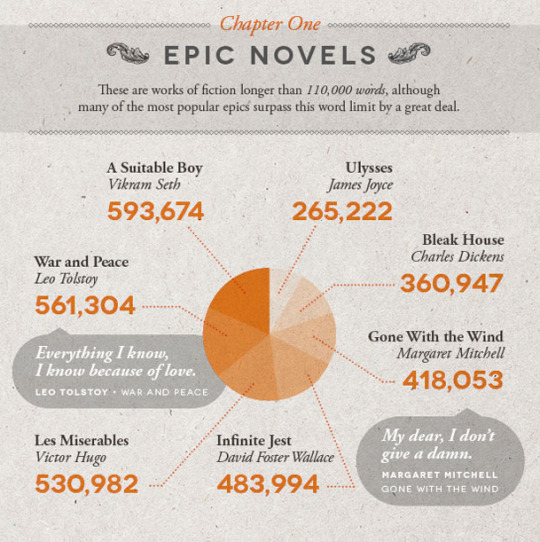
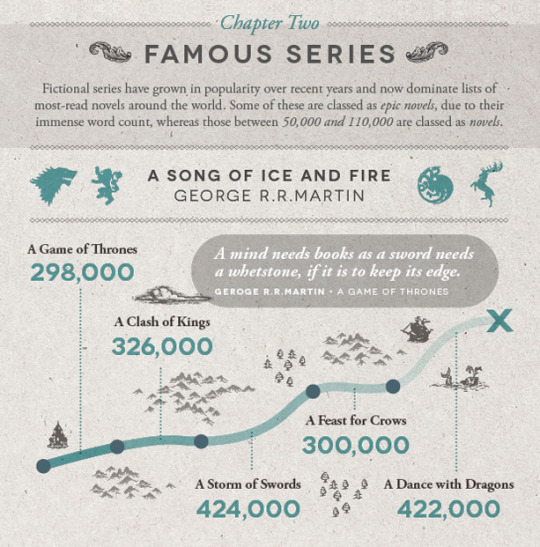
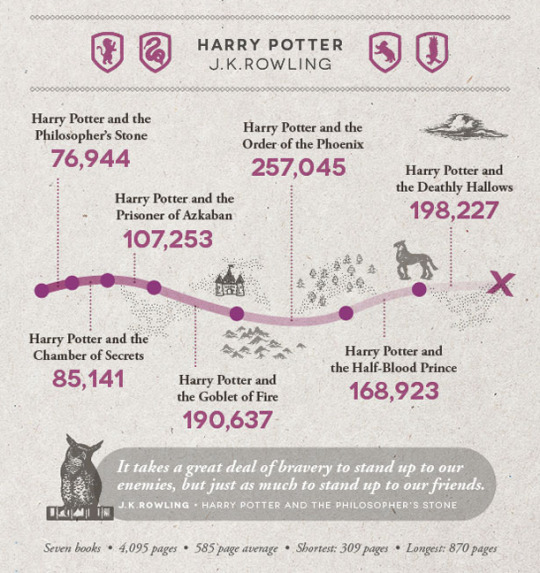
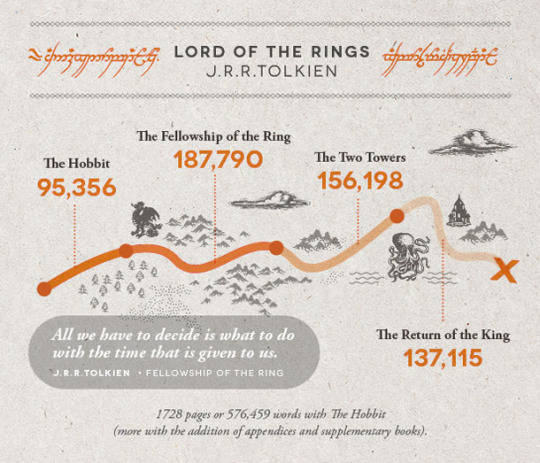
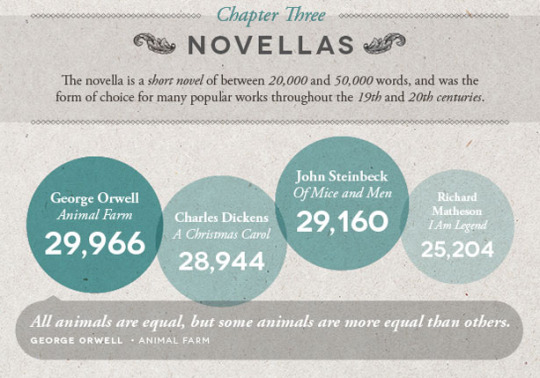
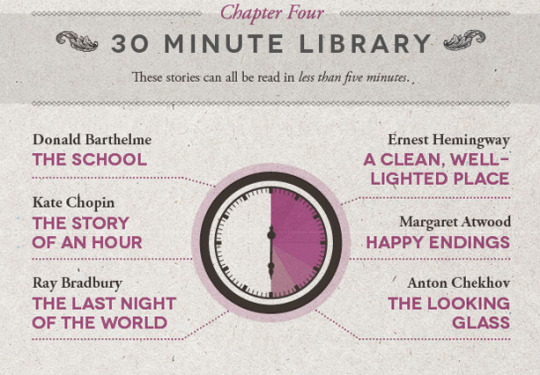
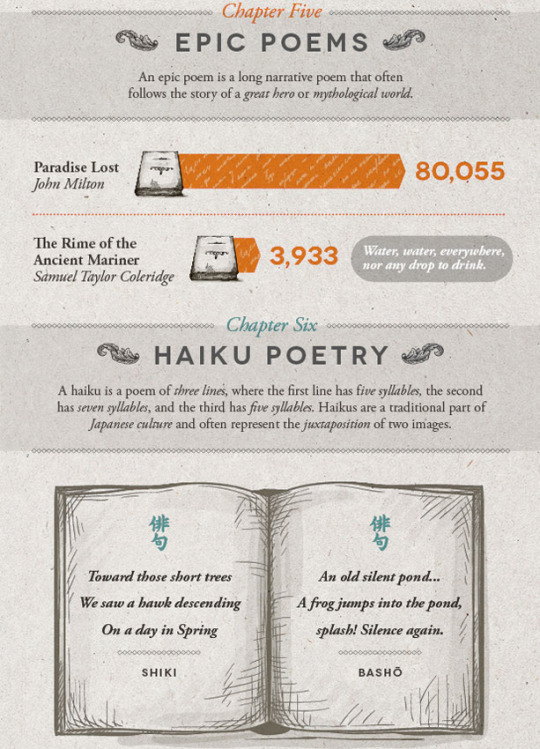
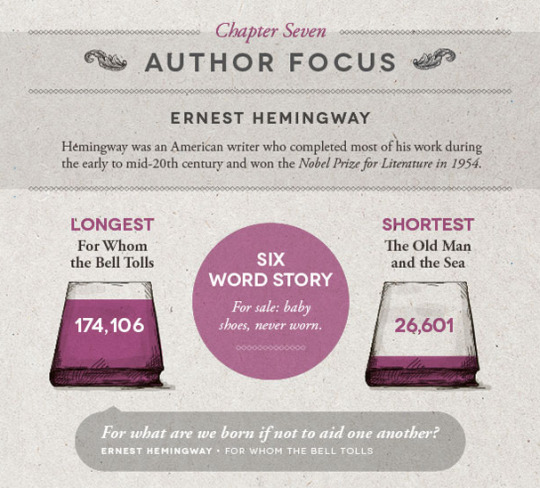
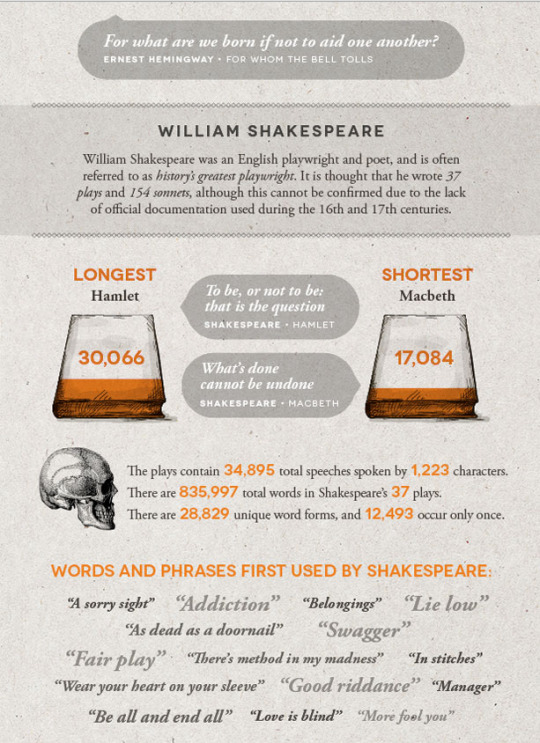
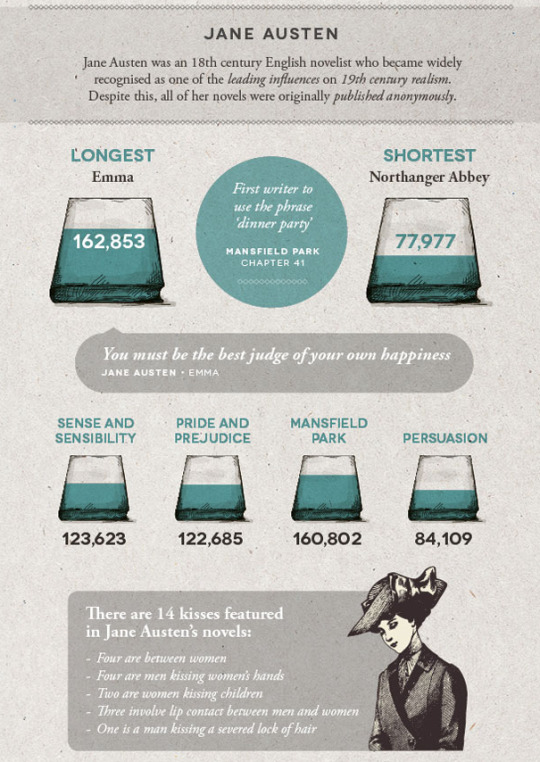
Literary Word Count Infographic: http://shortlist.com/entertainment/books/literary-word-count-infographic
35K notes
·
View notes
Photo
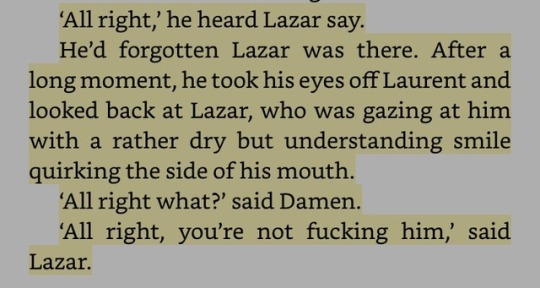





In general I don’t think I’ve appreciated Lazar and his raunchiness enough.
861 notes
·
View notes
Text
i think especially with relatively near future sci-fi and alternate present/just off reality sci-fi and fantasy, it’s a lot more effective to play off of “this word is the same, but the thing it refers to is in fact different than what you’ll initially picture or assume” than to invent a bunch of cutesy fake slang (again, ESPECIALLY for things we already have good words for)
like, for a real life example of what im talking about– we had “phones” in 1977, and we still have “phones” in 2017, but MAN would a time traveler from the 70s be confused by the things we call “phones” now, and the ways we use and relate to them– “im typing this text post on my phone, and autocorrect keeps cramping my style” is a straightforward and easily understandable sentence to me in 2017. it would sound like word salad to someone from 1977. (how can you TYPE something on a PHONE?? what does “post” mean in this context, or “text”? the fuck is “autocorrect”??)
but we still call them “phones”, you know, and not, idk, “cyberrectangles”
37K notes
·
View notes
Photo

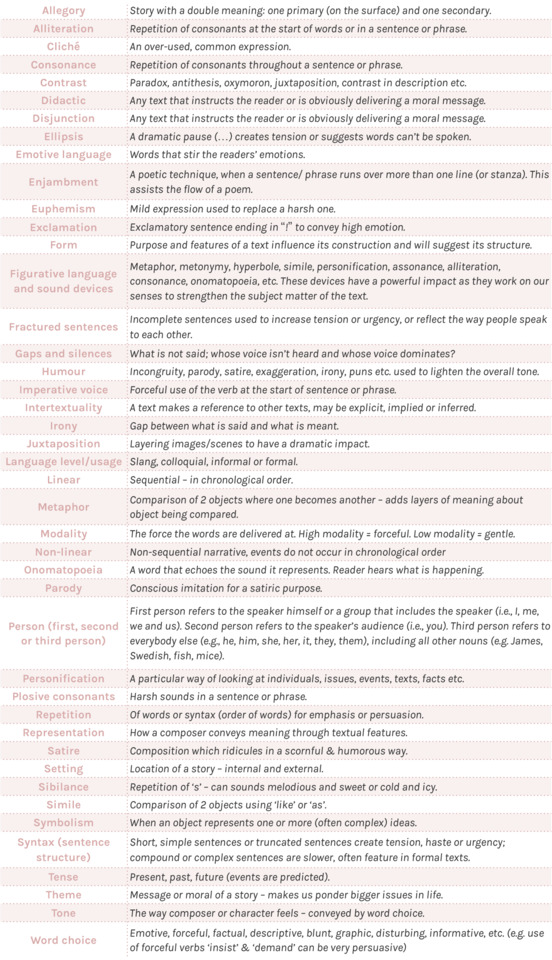
Literary Techniques
[click for higher resolution!] Whilst organising my hard drive, I found a document from English which covered lots of literary techniques. I always struggled remembering them so made this table and put it in my subject folder. I thought it might be nice to share this for those who also struggle with the specific meanings :-)
I also made a version which you can print, you can download it here.
Hope this helps!
Other posts | Printables | Instagram | Youtube | Pinterest
11K notes
·
View notes
Photo
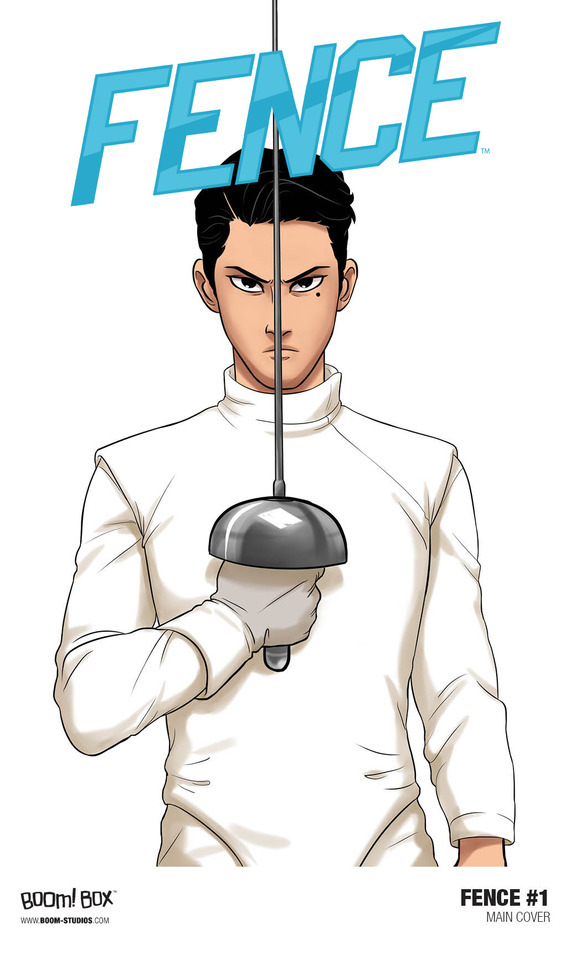
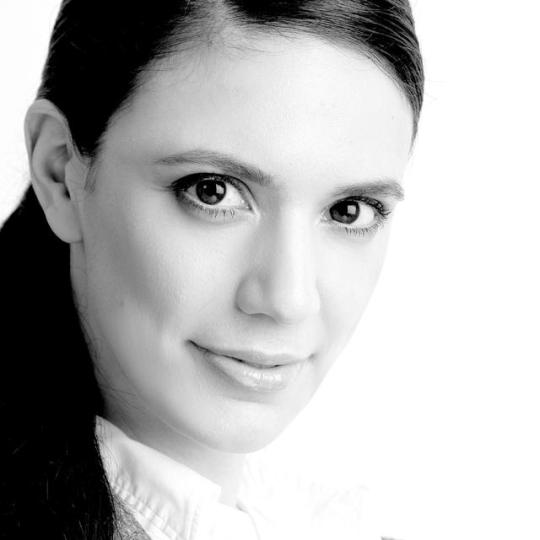

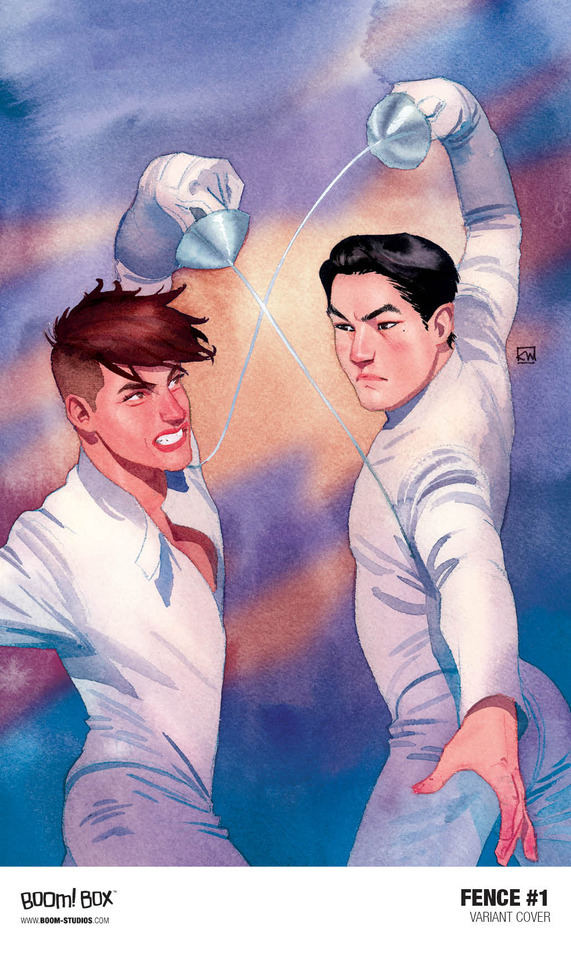
C.S. Pacat & Johanna The Mad on their new comic series Fence!
Writer C.S. Pacat (best known for her Captive Prince series) has been mercilessly teasing her fans with a new Top Secret Project™ for the last few days. Well, the wait is finally over, as the L.A. Times just broke the announcement for her new comic series, Fence!
Teaming up with the ridiculously talented artist Johanna The Mad, Fence follows Nicholas Cox as he joins the world of fencing at an elite boys school and becomes embroiled in the drama of competitive sports, team romance and rivalries, and good old self-discovery.
On finding inspiration for Fence, C.S. Pacat says, “I got really into sports comics in Japan, where I lived for about five years. I love the intense rivalries, the striving, the way you can take characters to their breaking point. Haikyuu!! and Hikaru no Go are easily some of my favourite comics of all time. Fence is like my love letter to the genre.
At the same time, I’m interested in female gaze and queer gaze art. I wanted to make something that had all the drama and intensity of a sports comic, while also being joyously and unabashedly queer. I was really inspired by Ngozi Ukazu’s fantastic hockey web comic Check, Please!, and the recent Japanese animation Yuri!!! on Ice. I started to wonder, what happens when those energies come out in a combat sport—when you add in the danger and stakes of fencing?”
“Fence means the world to me,” says Johanna The Mad. “It has always been one of my biggest dreams to draw comics, but I never thought I’d be able to work on one that I’d end up fangirling about!”
“Johanna’s artwork captures everything that is hot, dangerous, and exciting about fencing,” adds Pacat.
Fence #1 hits comic shops in November, and it’ll have covers from Johanna The Mad and Kevin Wada (and maybe someone else we’ll seeee~) and colors from Rebecca Nalty.
8K notes
·
View notes
Note
Hi do you know any books that are fiction but its based on history? Kinda like song of achilles any historical novels but gay? Or books that are rewritten to make them lgbt? Sorry if this ask is jumbled up haha thanks ❣️
And I Darken by Kiersten White is my fave example I’ve seen of this of alt-history with a gay protagonist. For rewritten to be LGBT - you might be interested in these! https://lgbtqreads.com/2016/05/27/fave-five-lgbtq-ya-retellings-of-classics/ There are also a couple more Cinderella retellings - Cinder Ella by S.T. Lynn and The Secrets of Eden by Brandon Goode - and for a gay Pride and Prejudice (not YA), check out First Impressions by Christopher Koehler.
There are a couple of YAs you’ll definitely wanna keep on your radar for 2018: The Unbinding of Mary Reade by Miriam McNamara and Lizzie by Dawn Ius!
96 notes
·
View notes
